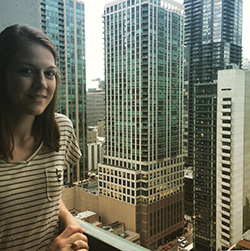You forgot about California and Johnny and Julian Temple and everything else as you and your dad walked. He told you about having to move into a one-bedroom apartment and selling most everything from your house. You listened to his lilting voice and found a melody there. He said he wasn’t sad about leaving the studio, but you thought he really was. After the guys at the record store had stopped asking for pictures and autographs and showing you your album in the store window, they told you how great your dad was at his job, and how much they loved having him around. A great guy, they said.
“What have you heard about me lately?” you asked, testing the waters. You wouldn’t have put it past the gas station to subscribe to the tabloids after they learned you were a big name.
“Not too much,” he answered.
“Haven’t seen the magazines or anything?”
“I think I saw a few a while back.”
You stopped walking. Sighed. “Dad. Mom showed up.”
He stopped walking too and turned to you. He shoved his hands in his pockets and you couldn’t read his expression. “Yeah, I know.”
You were surprised that it surprised you. “You know?”
“She showed up here, too.” He laughed. “She was ultimately what made me sell the house, if I’m being honest. She knew where to find me still, and it wasn’t right anymore, being there when it had been ‘ours.’”
“What happened?”
“Oh I suppose she thought I had some easy connection to you, or money, or that I was stupid. Probably all of the above. I told her to go to hell and that was that.”
“I should’ve done that.”
He put his hand on your shoulder, “She’s your mother. I would’ve been disappointed if you’d have just sent her away without giving her a chance. Mothers are part of our bindings, you know?”
“She made a mess of things for me, though,” you said.
“Nothing new, then.”
You kept walking in silence. A truck drove past, the sound of glass bottles rattling in the back.
“Do you remember that first song we wrote together?” you asked.
“Of course.”
“I was high during it,” you said with a laugh.
“Noah, give me some credit. I knew.”
He rubbed the back of his neck and then went into his shirt pocket and pulled out a joint.
“Are you serious right now?”
“There’s something else I should’ve told you,” your dad said. He rolled the joint between his fingers and sighed, like he was giving something up. “I’m sick, Noah.” You both stared at his hands as if the rolled paper would come to life and give you both a reason to talk about something else.
You let it sink in and came to an acceptance so quickly you were afraid. He kept spouting medical jargon, listing dates and procedures he had gone through already, trying out some consoling phrases like it’s not that bad. Your only response was to pull out your lighter.
The two of you found a bench and sat on it, taking pulls and just sitting in silence. The brightness from the sun consumed you, and soon you were replaying the past mistakes and regrets of your life. You came home so you could go forward, you reminded yourself. So, you looked forward. Forward to a future where it seemed you had made the right decisions, but you weren’t sure which decisions those were.
You’ll be thirty-years-old, you’ll have a wife and a daughter, but you’ll want to travel. You will move out of L.A., to a quiet neighborhood. Your father is fifty-one, still alive. You’ll write him a letter, include a picture of your daughter’s third-grade school picture. You’ll name her Elizabeth James Clarke, after him.
Time flashes even faster, colorful scenes blurring in your mind but giving off the same feeling of happiness, and comfort, and satisfaction.
The scenes slow. Now you’ll be sixty-years-old, a year older than your dad when he dies. Your daughter and sons will be older, too; one’s a painter, one runs a law firm, and one is in the police force. Or maybe one will be a teacher, and another will become a famous athlete. Sometimes you’ll hear some of your popular songs on the radio, but that time will feel far away now. You’ll be surprised to find you’re lonely – you’ll get updates from your children, but not many. You’ll wish they would visit more. You wonder if that’s the way of things, though. If children forget their parents because leaving is what happens, to everyone.
You were caught somewhere between then and now, hearing the feedback from a microphone, tasting the champagne in slender flute glasses while you toast your album’s #1 rating, squeezing your wife’s hand in the delivery room, boarding and exiting trains and planes and boats and stages. Faces smiles and sneer, people cheer and chant, arms hug and halt. On the bench, your dad tipped his head back and smiled while his fingers wrapped around your hand. Oh, don’t cry, don’t cry.
 Sara Cutaia was born and raised Texan, but she’s testing out the Midwest seasons in Chicago for a while. Currently an MFA – Fiction candidate at Columbia College Chicago, she is also a Graduate Student Instructor for Writing&Rhetoric. She is a book reviewer for Chicago Review of Books, and her fiction work is forthcoming in 805 Lit. Besides being a foodie and a bibliophile, she tries her best to pet every dog she sees.
Sara Cutaia was born and raised Texan, but she’s testing out the Midwest seasons in Chicago for a while. Currently an MFA – Fiction candidate at Columbia College Chicago, she is also a Graduate Student Instructor for Writing&Rhetoric. She is a book reviewer for Chicago Review of Books, and her fiction work is forthcoming in 805 Lit. Besides being a foodie and a bibliophile, she tries her best to pet every dog she sees.